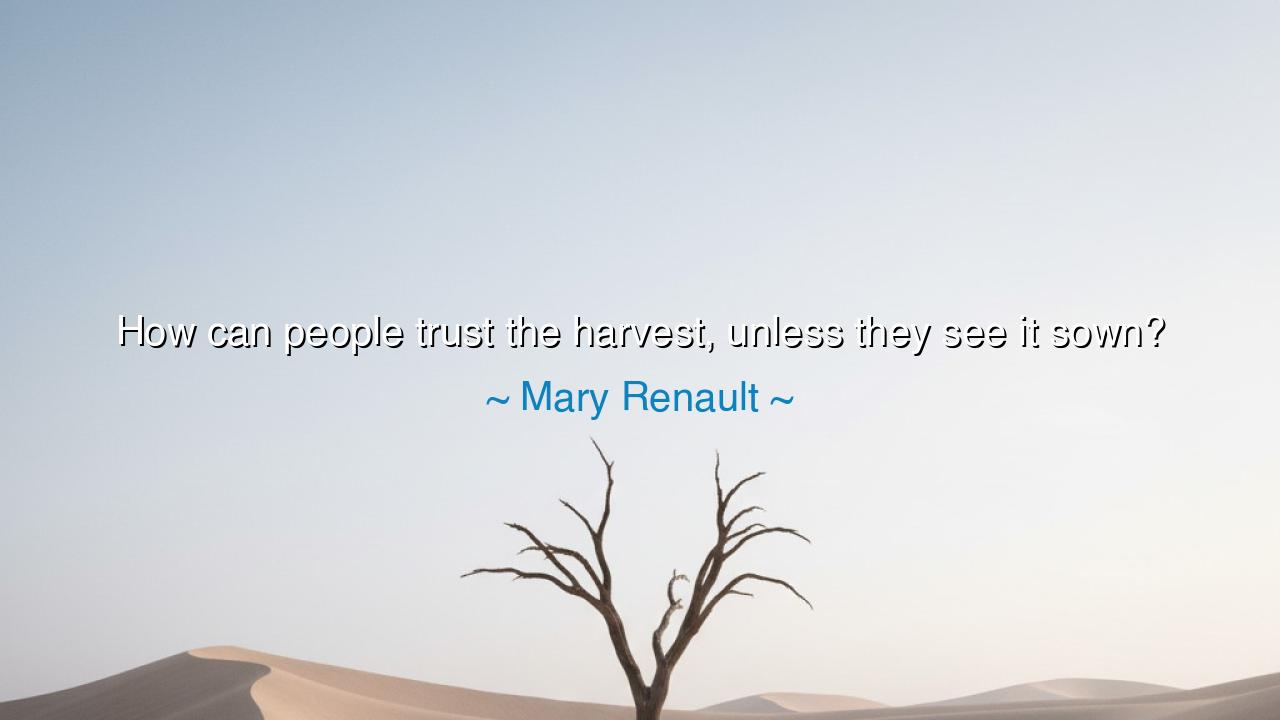
How can people trust the harvest, unless they see it sown?






The words of Mary Renault—“How can people trust the harvest, unless they see it sown”—resound with the imagery of the earth itself, speaking not only of fields and crops, but of the labor of men, the promises of leaders, and the faith of entire generations. In this question, Renault draws attention to a truth both practical and spiritual: no one can be expected to believe in the fruits of tomorrow unless they witness the work of today. The harvest may be glorious, but without the sight of seed falling into the soil, without the evidence of toil and preparation, it is only a dream, an empty promise, a word without proof.
The origin of this reflection comes from Renault’s life as a novelist who often delved into the ancient world, weaving stories of Greece, its heroes, and its philosophers. Her writing, though fictional, bore the weight of historical insight, for she understood how societies build faith not by grand speeches, but by steady deeds. Just as the farmer’s promise of abundance is meaningless unless he bends to the earth and sows, so too are leaders, teachers, and parents required to show their labor before they ask others to trust in the outcome. Her words are a parable of integrity, of accountability, and of the visible connection between labor and reward.
History provides vivid examples of this principle. Consider the American Civil Rights Movement. When Martin Luther King Jr. spoke of a future where children of all races could join hands in equality, his vision was radiant. But what made people believe him was not only the beauty of his words, but the countless acts of sowing—the marches, the sit-ins, the sacrifices of ordinary men and women who planted the seeds of justice through their courage. Without those seeds, the harvest of progress would have seemed impossible. The power of the dream was proven by the labor of the present.
The same truth may be seen in the life of Mahatma Gandhi. He spoke of independence, of a free India where the people governed themselves. Yet he did not merely demand the harvest—he showed the sowing through his life of discipline, his salt march, his imprisonment, and his practice of nonviolence. The people trusted him, because they saw him lay the seeds into the soil of sacrifice and truth. And when freedom finally came, it was not unexpected bounty, but the fruit of labor long endured.
The meaning of Renault’s words is therefore clear: promises without action are barren fields. A leader who proclaims a golden future but shows no evidence of sowing invites only cynicism. A parent who demands respect without showing love, or a teacher who speaks of knowledge without planting the seeds of learning, builds nothing that can last. Faith grows where evidence is seen; trust is born where the sowing is made visible. The connection between work and reward must be clear, or else the harvest is doubted, no matter how great the words.
The lesson for us is profound. If you would have others trust you—whether in your family, in your work, or in your community—do not merely speak of what will be. Show the seeds you are planting. Show the labor you are willing to bear. Let others see that your promises are not dreams spun from air, but fruits that will grow from work already begun. For just as the farmer proves his promise by the sight of seed cast into the furrow, so too must each of us prove our words by our actions.
Practically, this means aligning vision with deed. Do not promise what you have not begun to prepare. When you speak of change, show the small steps you are taking toward it. When you dream of greatness, let others see the seeds of discipline and sacrifice. And when you ask for trust, remember that trust cannot live on words alone—it must be nourished by proof, by example, by the visible sowing of today.
Thus, Mary Renault’s words endure like an ancient oracle: “How can people trust the harvest, unless they see it sown?” They remind us that the credibility of the future is built in the actions of the present, and that no harvest—whether of grain, of justice, or of love—can be believed in unless the seeds are sown in sight of all. Sow well, sow faithfully, sow openly, and the harvest will not only come, but it will be trusted and celebrated by all who await it.






AAdministratorAdministrator
Welcome, honored guests. Please leave a comment, we will respond soon